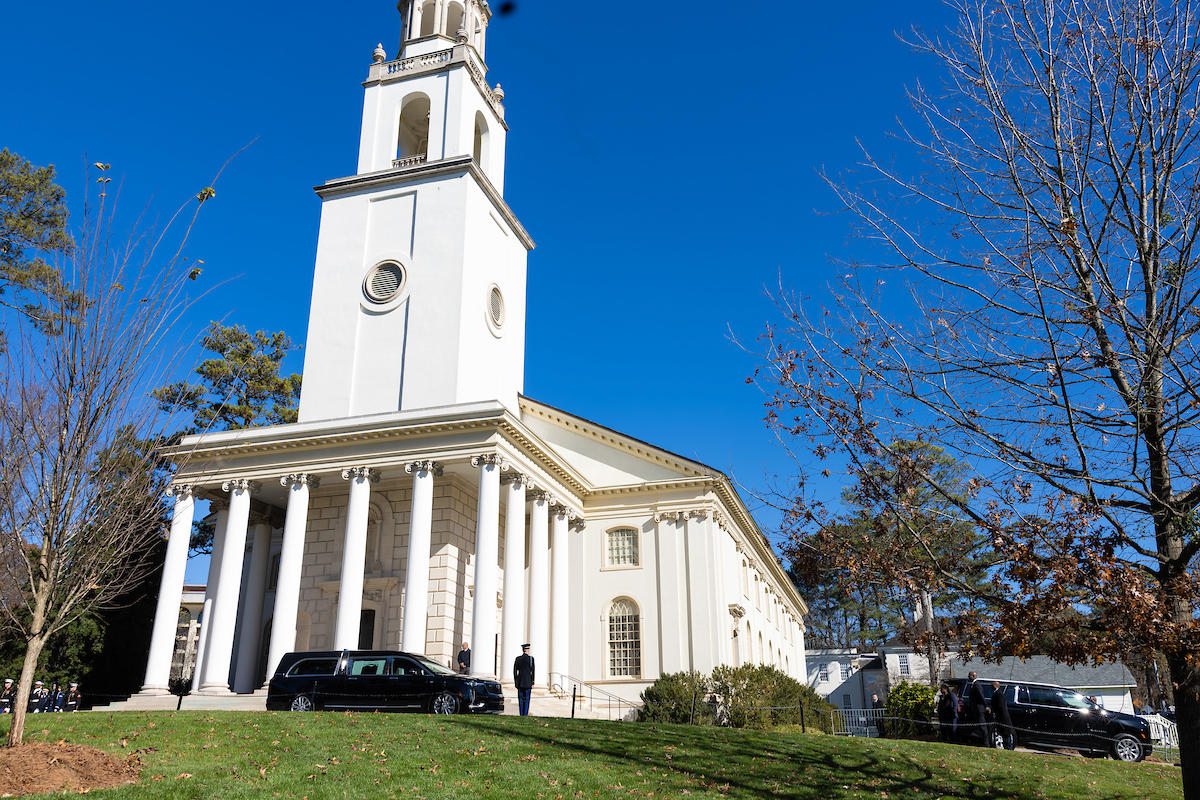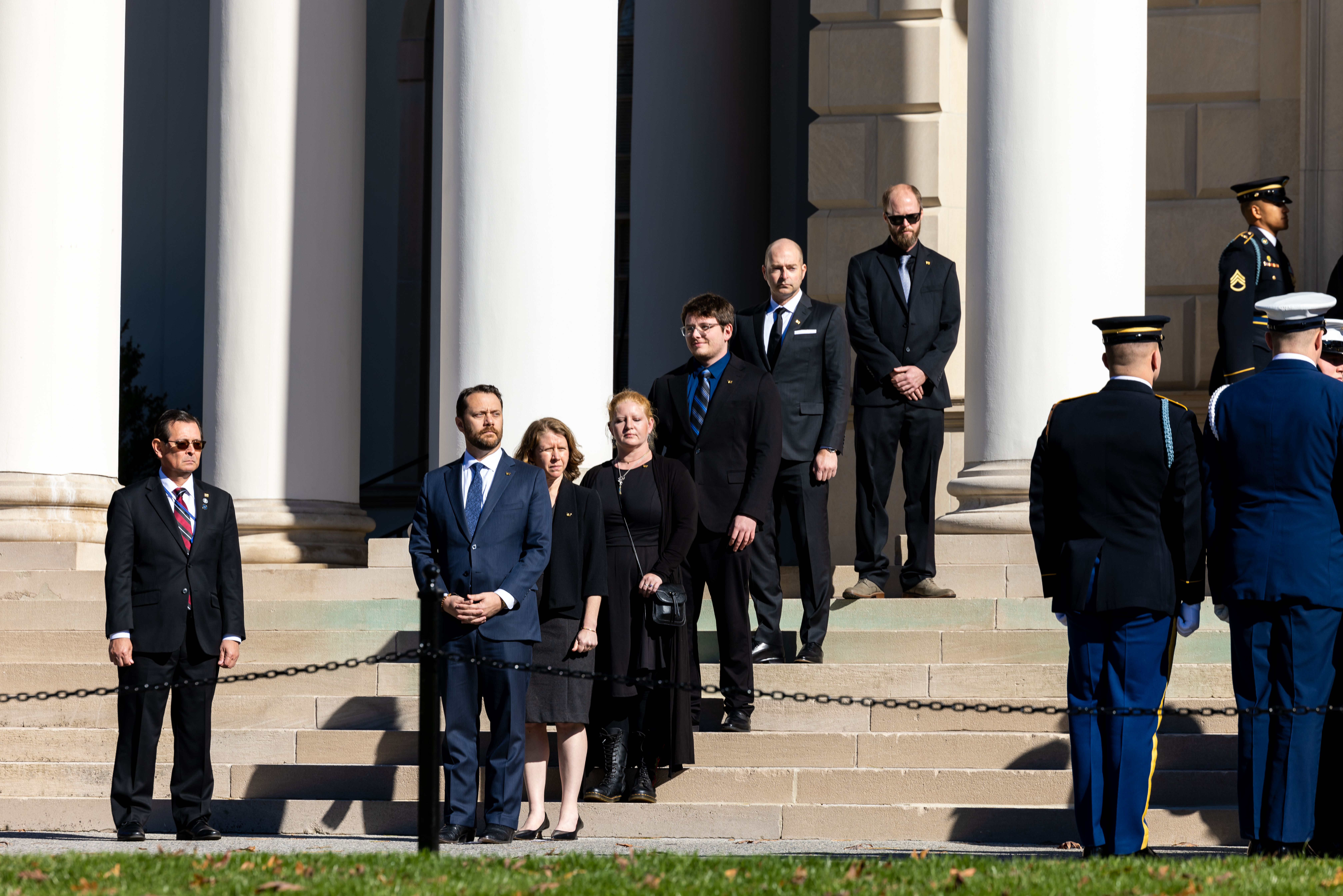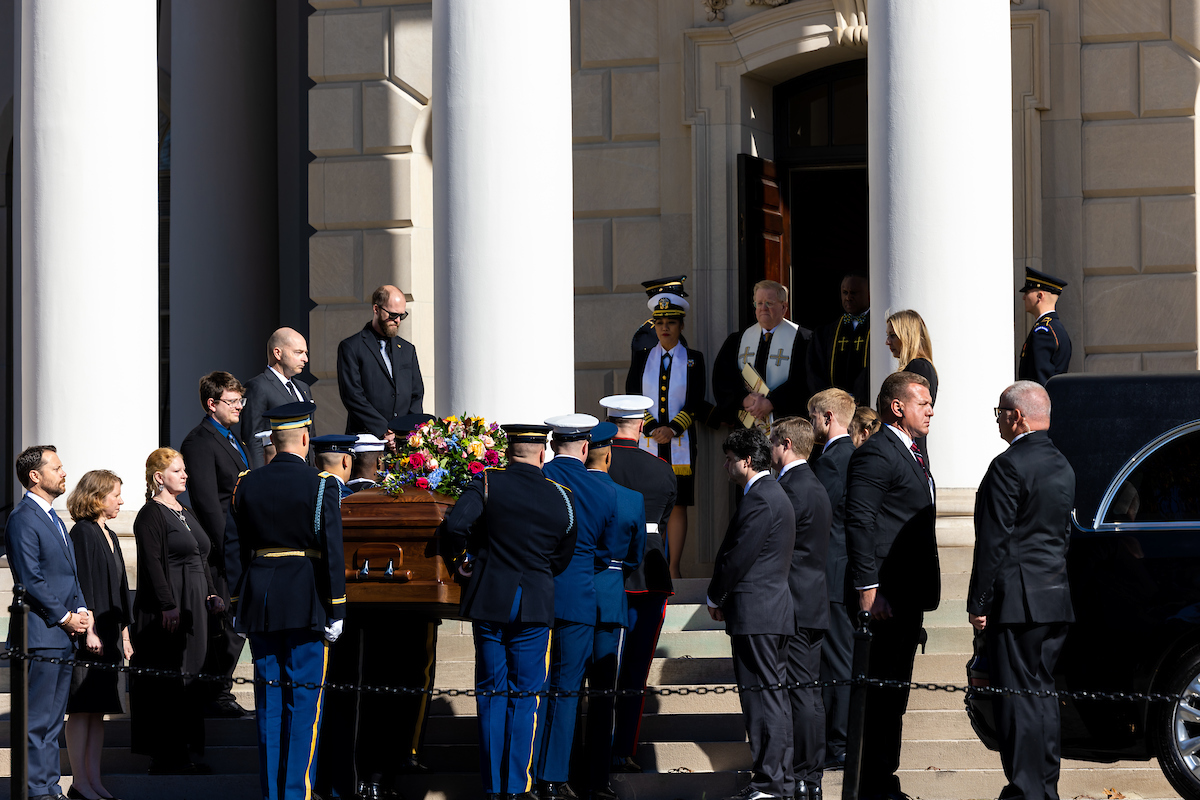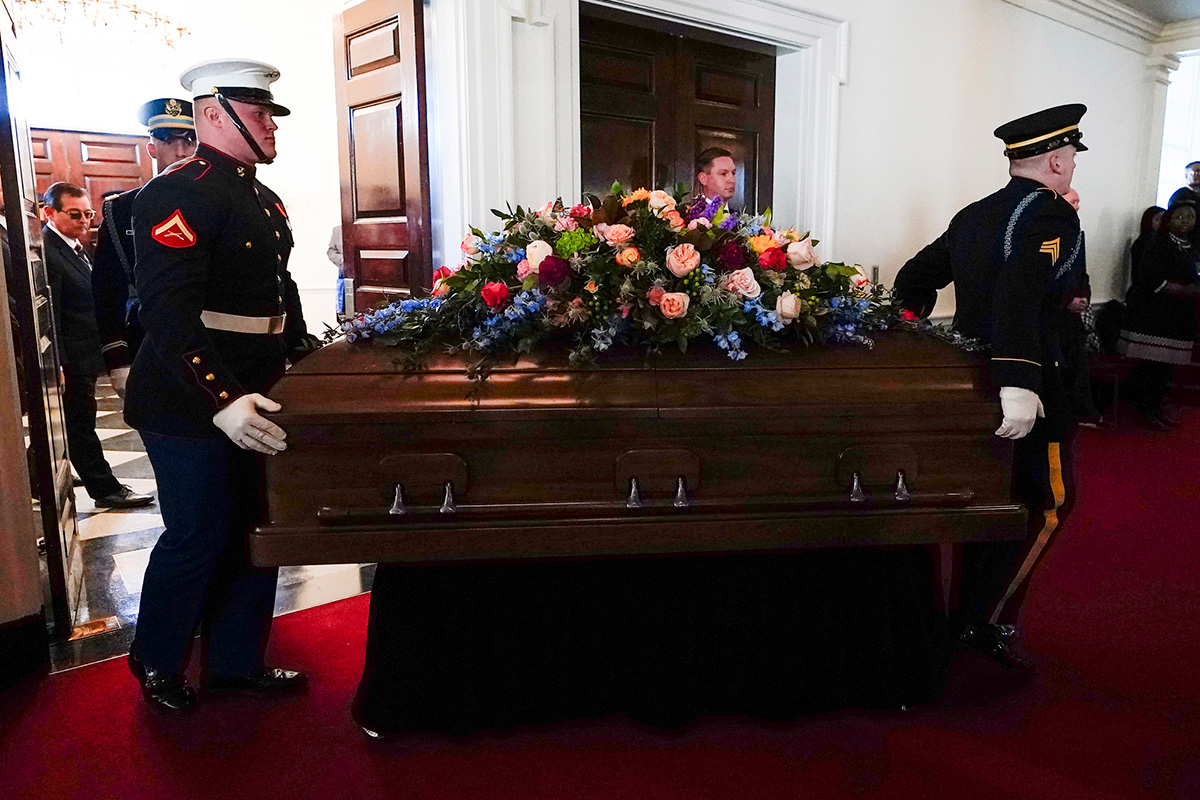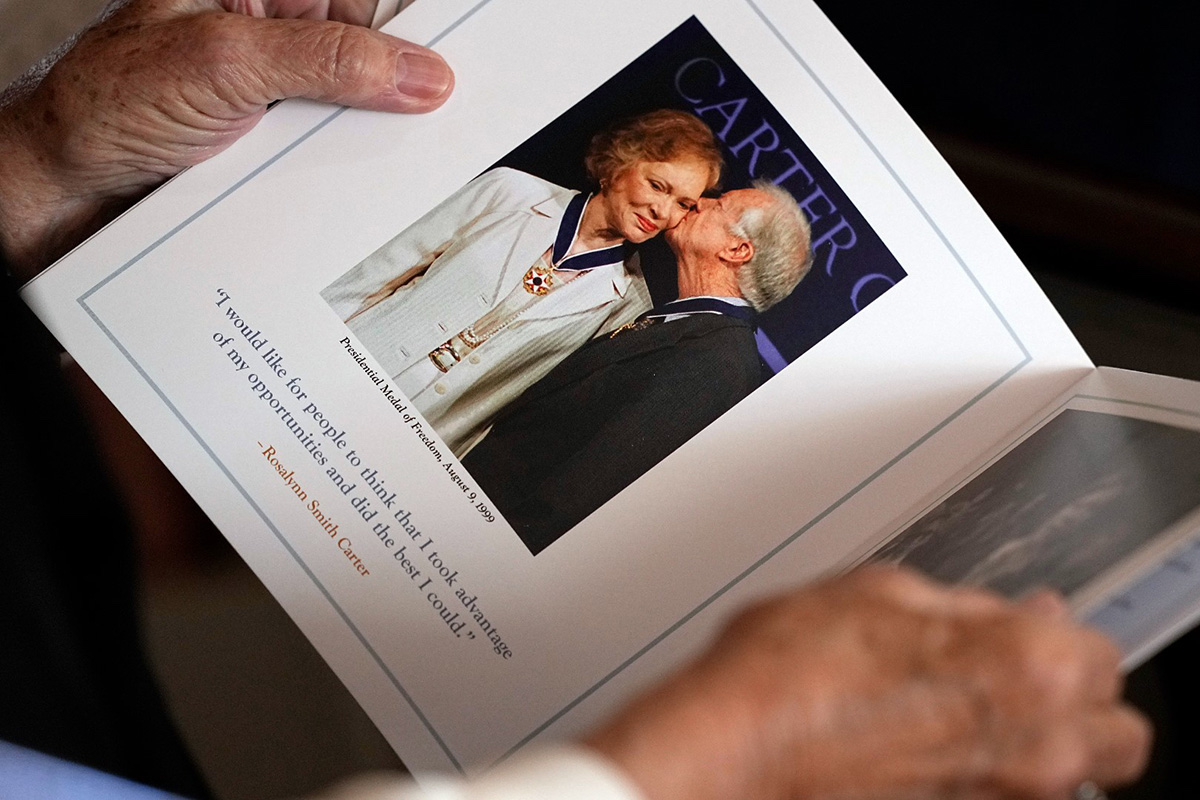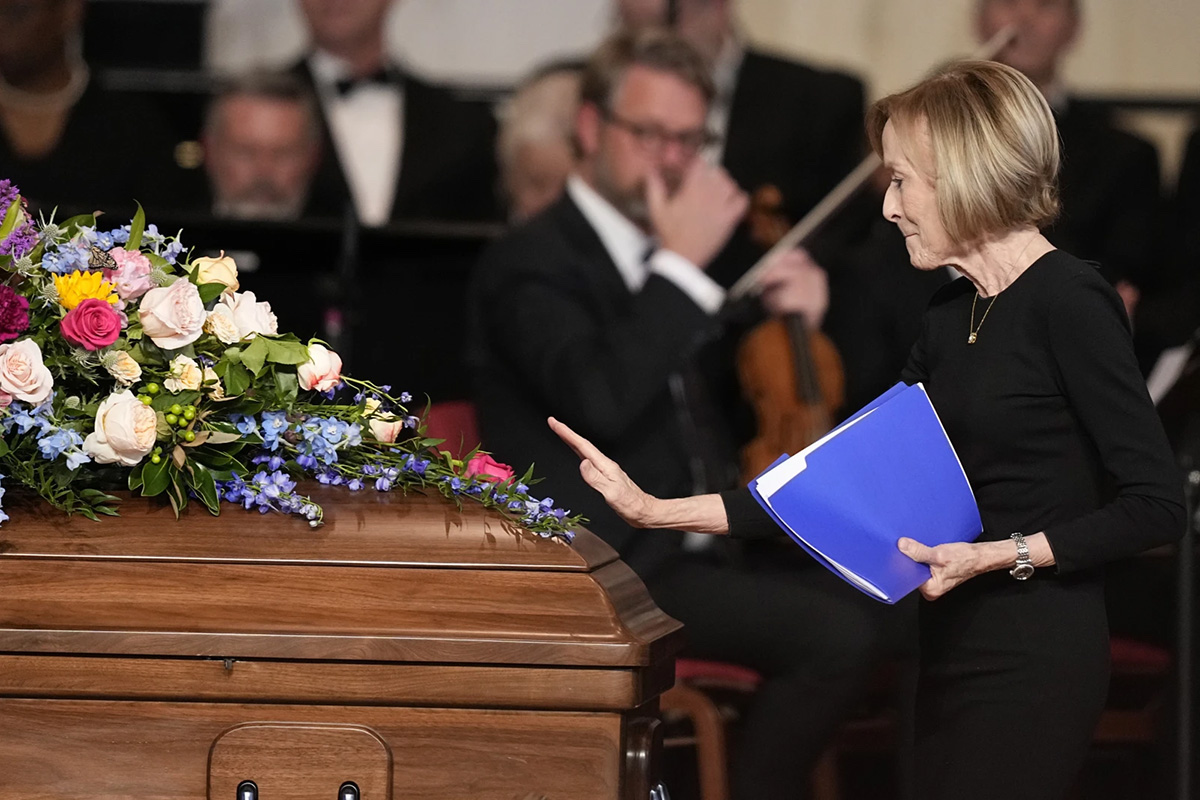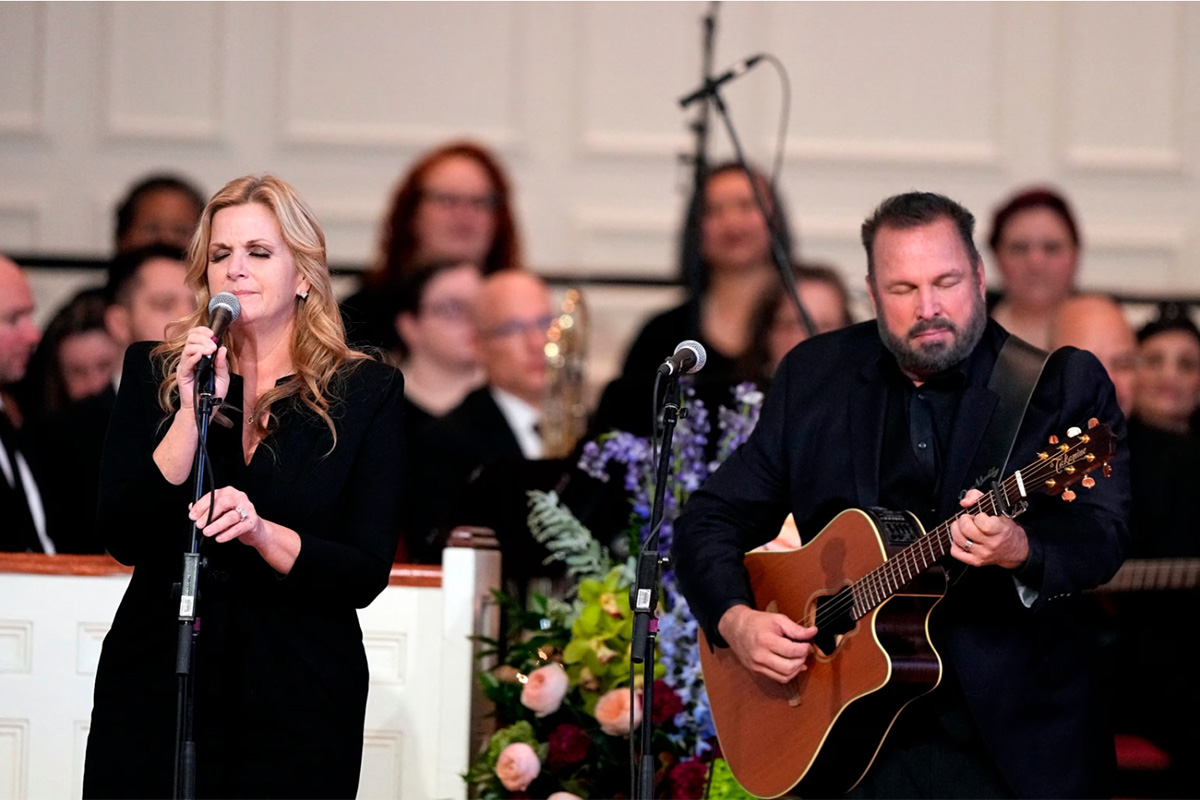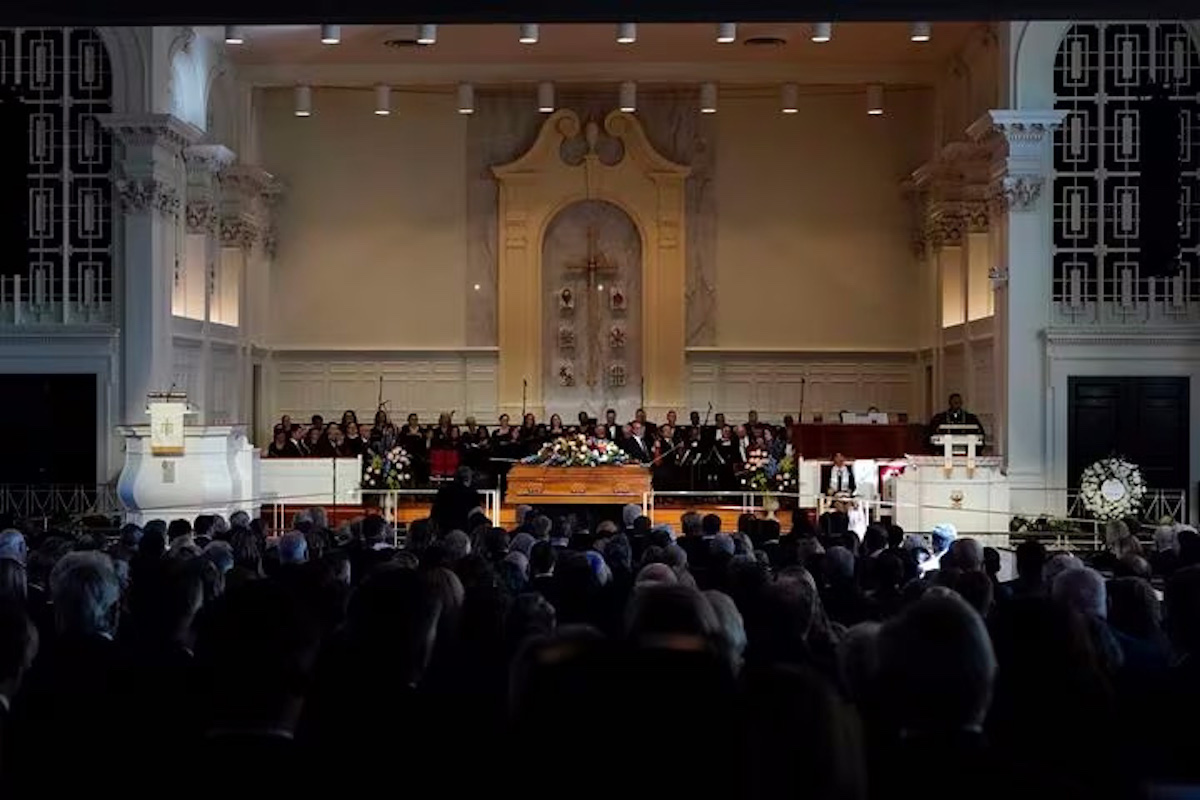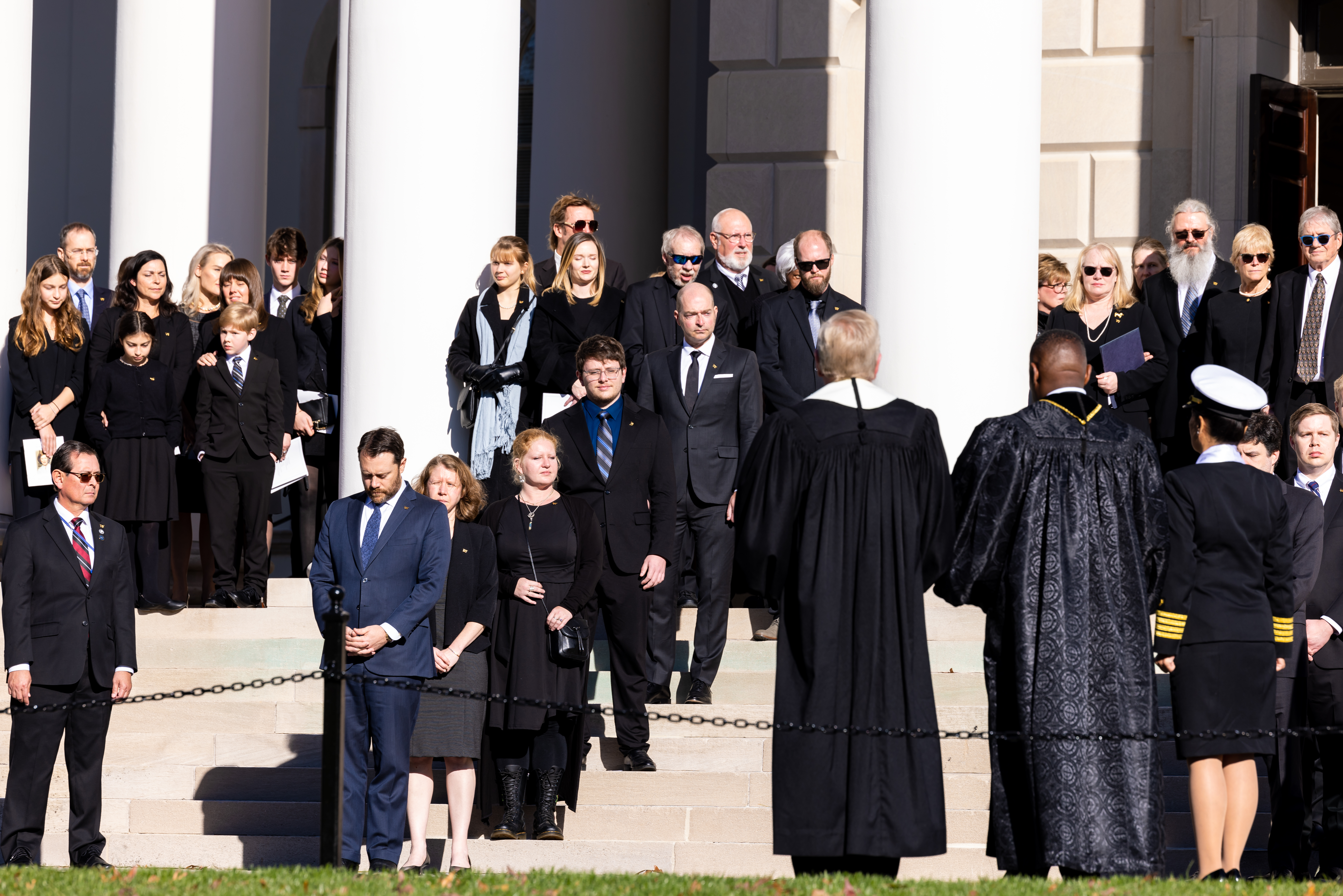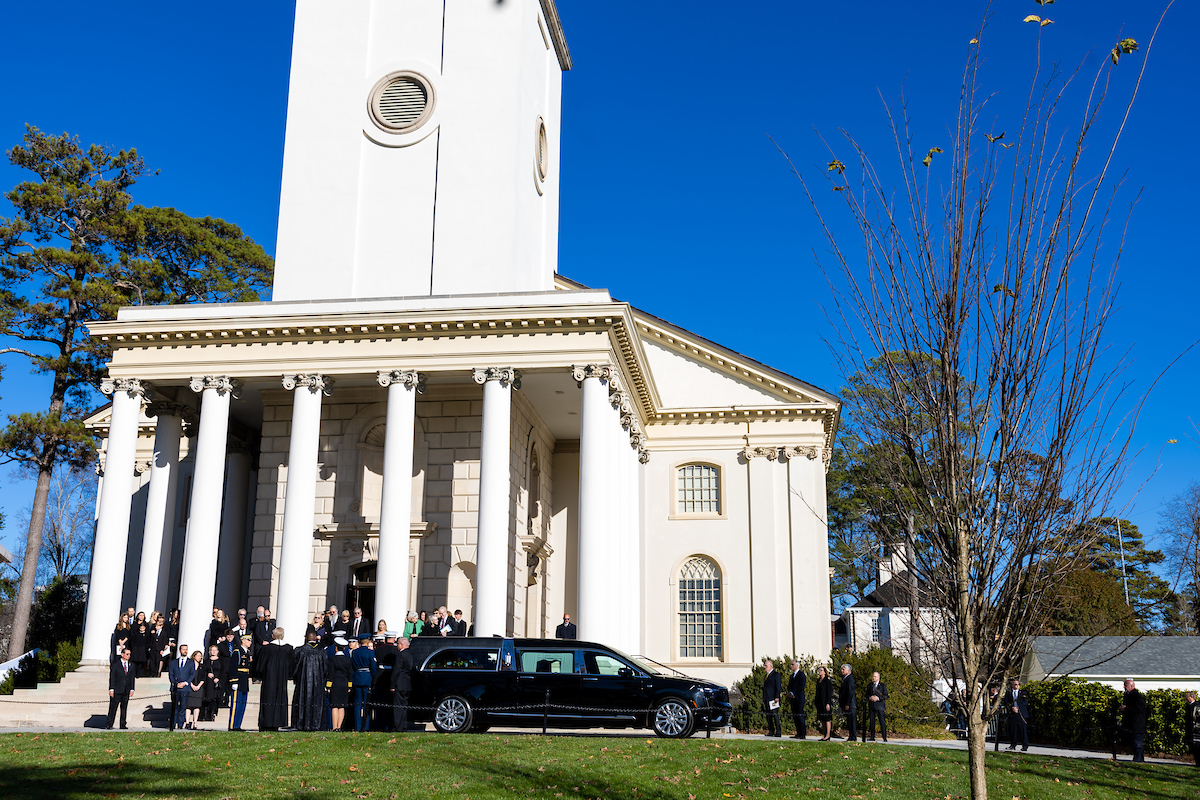I want to use my influence to give voice to those who may be powerless and persuade the powerful to listen.
Hundreds of invited guests gathered at Emory’s Glenn Memorial United Methodist Church on Tuesday for the tribute service honoring the life and legacy of Rosalynn Carter, former first lady of the United States and a longtime advocate for mental health and myriad human rights issues.
Mrs. Carter, age 96, passed away on Nov. 19 at the unassuming home in Plains, Georgia, which she and President Jimmy Carter built in 1961 and returned to after their time in the Georgia governor’s mansion and the White House. In May, keeping with her work to ease the stigma often associated with mental health issues, her family shared the news that Mrs. Carter had dementia.
President Carter, now 99 and in hospice care since February, traveled to Emory to attend the service for his beloved partner and wife of 77 years. The couple has worked closely with the university since 1982, when President Carter was named Emory University Distinguished Professor and they founded The Carter Center in collaboration with Emory.
A powerful advocate in her own right, Mrs. Carter partnered for decades with Emory experts, uniting her vision of a more equitable health care system with the university’s strengths in research, training and service.
“Her tenure as first lady of the United States was just one chapter in a life that was really devoted to caring and doing good for others,” recalled speaker Kathryn Cade, Mrs. Carter’s friend and her director of projects in the White House.
Tuesday’s tribute service was attended by President Joe Biden and first lady Jill Biden, Vice President Kamala Harris and second gentleman Douglas Emhoff, former President Bill Clinton and former Secretary of State Hillary Clinton, and former first ladies Laura Bush, Michelle Obama and Melania Trump, as well as state and local officials including Georgia’s U.S. Sens. Raphael Warnock and Jon Ossoff, Georgia Gov. Brian Kemp, Atlanta Mayor Andre Dickens and former U.S. Ambassador Andrew Young.
Yet despite the many leaders in attendance, the tribute service was, first and foremost, a family affair — befitting a woman who, her family members recalled during the service, made a global impact while also cherishing her role as a down-to-earth mother, “cool grandma” and great-grandmother.
Accompanied by her grandchildren serving as honorary pallbearers, Mrs. Carter’s casket entered the sanctuary to “America the Beautiful.”
“My mother was the glue that held our family together,” son James Earl “Chip” Carter III reflected, describing how Mrs. Carter’s work as first lady and with The Carter Center led her to more than 120 countries, while just a few years ago she also dressed up as a monarch butterfly to enjoy trick-or-treating with her grandchildren and great-grandchildren.
Mrs. Carter’s family and friends played prominent roles in the ceremony, drawing tears, laughter and applause as they reflected on the lessons learned from her lifetime of caring for both the people closest to her and for millions around the world who she never met but whose lives were improved by her advocacy and service.
“What a remarkable woman she was — wife, mother, business manager, political strategist, diplomat, advocate, author — yet what I remember most about her was her tireless dedication to taking care of others,” Cade said.
The issues to which Mrs. Carter devoted her attention — mental health, support for caregivers, childhood immunization, the problems of the elderly, neglected tropical diseases, even building latrines in areas without sanitation — were not “glamorous,” Cade noted, but reflected her lifelong focus on “alleviation of suffering” and “finding joy in the simple act of service.”
‘What a gift she left’
Interspersed throughout the service, the Carters’ young grandchildren and great-grandchildren offered readings of her favorite Scriptures. Musical performers included the Atlanta Symphony Orchestra, the symphony’s Chamber Chorus, pianist David Osborne and country musicians Trisha Yearwood and Garth Brooks. The couple, friends of the Carters, sang John Lennon’s “Imagine.”
Journalist Judy Woodruff described meeting Mrs. Carter during President Carter’s 1970 gubernatorial campaign, then covering the Carters throughout his time as Georgia governor and as president.
“What we witnessed was a first lady who saw her role as going well beyond the essential warm and welcoming host” to be a trusted adviser and “in essence an extension of the president himself,” she said.
“At the White House and in the many years before and since, championing the rights of the underserved, coming to the aid of the most vulnerable, doing whatever she could to improve the lives of others so she wouldn’t have regrets that she hadn’t done everything in her power to do — that’s who she was,” Woodruff explained.
“Without Rosalynn Carter, I don’t believe there would have been a President Carter. She and the two of you set an example for all of us. … Because of Rosalynn Carter, millions of lives are better off. What a gift she left.”
Amy Lynn Carter, the Carters’ daughter, recalled how “my mom spent most of her life in love with my dad.” Since President Carter could not address the service, she instead read excerpts from a letter he wrote to Rosalynn 75 years ago, when he was away serving in the Navy, about how he would fall in love with her again every time he saw her.
It concluded: “Goodbye, darling. Until tomorrow, Jimmy.”
‘She poured out her love all over the world’
Jason Carter, the Carters’ grandson and now chair of The Carter Center’s board of trustees, described her as the “cool grandma” who used a sword to practice tai chi and once, on a flight with family members for a vacation, whipped out a container of pimento cheese, made sandwiches for her relatives, then continued making them for other passengers as well. “She loved people,” he said.
Recalling her work with The Carter Center, including helping to bring the plague of guinea worm to the brink of eradication, “she poured out her love all over the world,” he said. “It was natural to her to open up her heart to people, not with pity but as partners.”
After the service, current and past Emory presidents stood together along the front driveway of Glenn Memorial, paying their final respects as the hearse and motorcade departed for Plains, where Mrs. Carter’s funeral and burial would take place Wednesday.
Emory President Gregory L. Fenves was joined by former university presidents Claire E. Sterk, James W. Wagner and William M. Chace to bid farewell to one half of the couple who helped shape the university for decades — and whose impact here will continue through Emory’s collaboration with The Carter Center for decades to come.
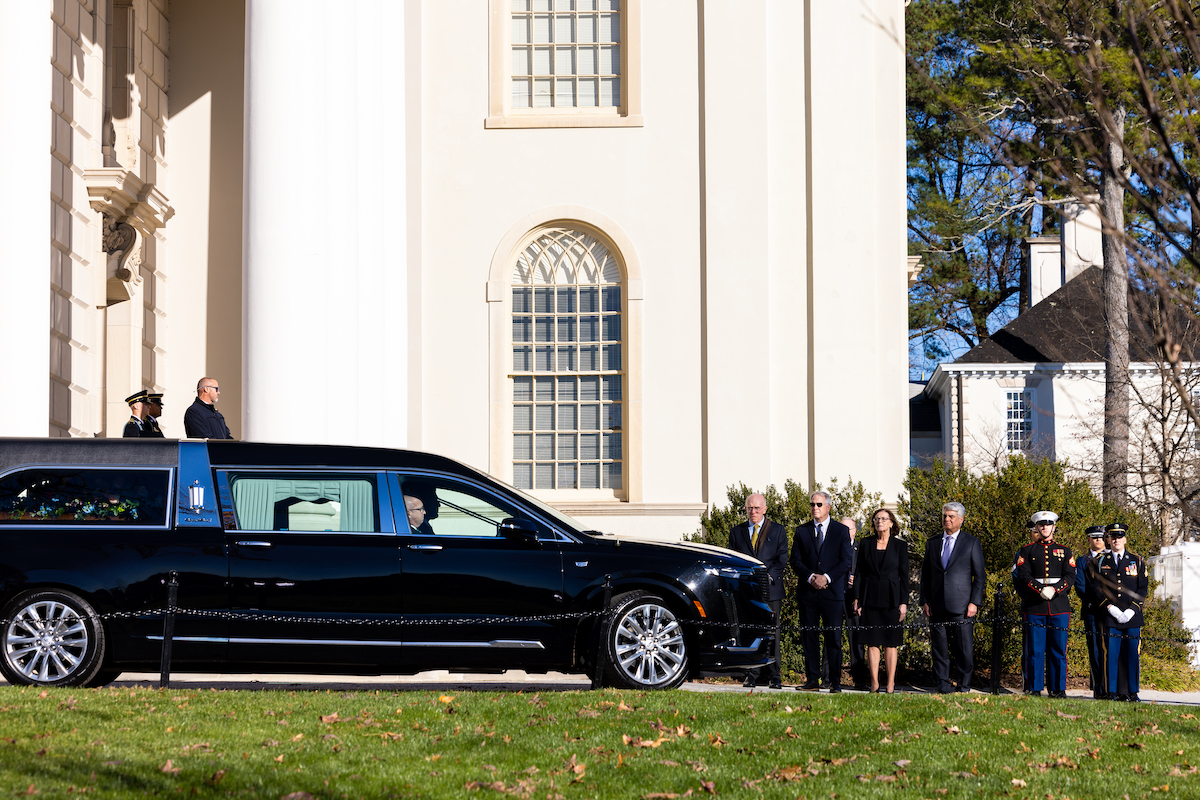
Former Emory presidents (left to right) William Chace, James Wagner and Claire Sterk joined current President Gregory L. Fenves to bid a final farewell to Rosalynn Carter, who collaborated with the university for more than 40 years.
Exterior photos by Sarah Woods of Emory Photo/Video. Interior photos by Associated Press / Brynn Anderson – Pool.
Highlights of Rosalynn Carter’s impact at Emory
Rosalynn and Jimmy Carter worked closely with Emory for more than 40 years, including through the launch and ongoing work of The Carter Center, which was founded in partnership with the university. In addition:
- After leaving the White House, Mrs. Carter turned to the Emory Department of Psychiatry for help in launching the Rosalynn Carter Symposium on Mental Health Policy in 1985.
- Once the permanent facilities of The Carter Center opened, the symposium moved there from the Emory campus, and The Carter Center Mental Health Program began. Through the years, the program has benefited from a dynamic relationship with Emory that has included the departments of psychiatry and psychology as well as the Rollins School of Public Health and Nell Hodgson Woodruff School of Nursing.
- In 2003, Benjamin Druss was named the inaugural Rosalynn Carter Chair in Mental Health in Emory’s Rollins School of Public Health. Druss also serves on The Carter Center’s Mental Health Task Force.
- Emory alumna Eve Heemann Byrd has served as director of The Carter Center Mental Health Program since 2017.
- Carter’s steadfast support of women’s equality was also a hallmark of her association with Emory. She served as Distinguished Fellow from 1989-2018 of what was, first, Emory’s Institute for Women’s Studies, then the Department of Women’s Studies and since 2011 the Department of Women’s, Gender and Sexuality Studies (WGSS).
- Throughout a nearly three-decade association with WGSS, Mrs. Carter regularly hosted WGSS undergraduate classes at The Carter Center.
- In 1990, Emory’s first set of Rosalynn Carter Fellows in Public Policy was named. The fellows program, which continued through the early 2000s, named women distinguished for their national, state and community service as honorary fellows for a three-year term.
- Emory’s first Rosalynn Carter Distinguished Lecture in Public Policy followed in 1993, reflective of Mrs. Carter’s work with the department to develop a series of programs in public policy. The annual lecture series was active through the early 2000s.

